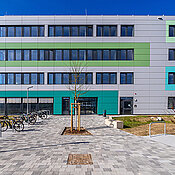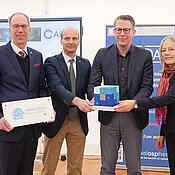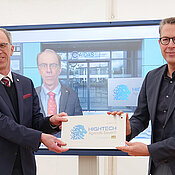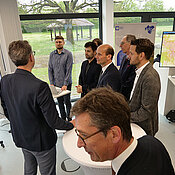New Building for the CAIDAS AI Centre Opened
04/19/2024It can happen that quickly: After just one year of construction, the new building for the university's AI centre CAIDAS was completed. Bavaria's Science Minister Markus Blume attended the opening.
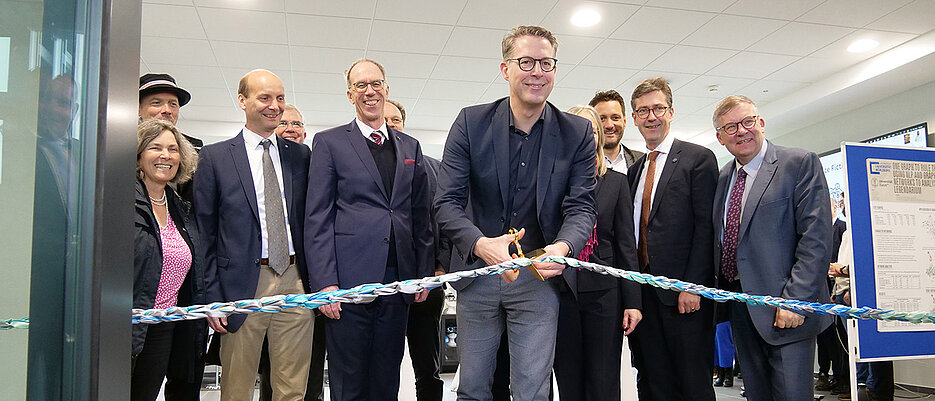
With its façade designed in shades of green and grey, the new AI centre at Julius-Maximilians-Universität Würzburg (JMU) is a real eye-catcher on campus: CAIDAS, the Centre for Artificial Intelligence and Data Science, was officially opened on 19 April 2024 with prominent guests from politics and science.
Bavaria's Minister of Science Markus Blume cut the ribbon for the new building: "The next highlight of our AI mission: the opening of CAIDAS in Würzburg. The Centre for Artificial Intelligence and Data Science will finally make Julius-Maximilians-Universität the AI Mecca on the Main. AI research is being rethought here - and perfected: the focus is on data processing and research is interdisciplinary - eight faculties are on board. This shows that artificial intelligence is an important tool for all faculties. We are only at the beginning of a new age of AI. The greatest danger is not being part of it and leaving the field to others. In Bavaria, we are on board: we want to shape AI with our data and according to our values. With CAIDAS, JMU is ensuring that AI is spelt Bavarian."
University President Paul Pauli had previously welcomed the guests. With regard to CAIDAS, the university has made a very successful start: "20 CAIDAS professorships have been filled with high-calibre candidates, and with computer vision expert Radu Timofte, we were even able to attract a Humboldt Professor to JMU. We play a leading role in the Bavarian AI network!"
Appearance: The Avatar of the University President
"Developing responsible solutions for the digital world" is the motto of the Würzburg AI Centre, as CAIDAS spokesperson Professor Andreas Hotho said in his speech. He presented the centre's structure and programme to the guests.
Andreas Hotho provided a vivid insight into the human-centred AI research of Professor Marc Latoschik and Professor Carolin Wienrich when he presented the audience with an avatar of JMU President Paul Pauli. In Pauli's unmistakable original voice, the avatar asked Minister Blume to step forward and present the President with the Hightech Agenda Bayern plaque that will adorn the new CAIDAS building. The audience was enraptured.
After the symbolic handover of the keys by Grit Liebau, Deputy Head of the Würzburg State Building Authority Staatliches Bauamt, the Minister and several VIP guests from the world of politics were given a guided tour of the new building. The university's AI research teams provided information about their work at several stations.
Facts About the New Building
The new CAIDAS building is located on the North Campus next to the mathematics institutes. It offers modern research and seminar rooms, offices and meeting rooms on a floor space of around 2,350 square metres. The construction costs for the L-shaped building amounted to around 14 million euros, 10.23 million of which came from the Hightech Agenda Bayern (HTA) modular construction programme.
The short planning and construction time was record-breaking, as Grit Liebau emphasised when handing over the keys. The planning contract was awarded at the beginning of 2021, construction began in August 2022, the topping-out ceremony was held in January 2023 and the first research groups were able to move in in September 2023. On the one hand, this speed was due to administrative simplification with significantly fewer decision-making levels and far fewer procedures to go through. Secondly, a modular design with a prefabricated construction system and room modules in the same sizes and with the same equipment made planning and construction easier and more efficient.
The building currently houses four chairs and one professorship, with up to two more teams to be added in the next one to two years. Research questions in the areas of data science, complex networks and language processing as well as human-computer interaction and the psychology of intelligent interactive systems, both with a focus on extended reality, will be addressed here. The areas of application include environmental sciences, medicine, security in networks, software engineering, information systems, social sciences and digital humanities.
Who is Currently Researching and Teaching in the New CAIDAS Building
Chair of Computer Science X (Data Science), Professor Andreas Hotho
A central area of the chair is research into customised data science algorithms and the development of new machine learning methods, in particular deep learning, for a wide range of interdisciplinary applications. One focus is on applications for ecosystems, environmental and climate data. Among other things, deep learning methods have been developed to improve climate models or to analyse data from beehives. Other areas of focus include research into language processing models using additional knowledge to analyse novels, as well as documents and chat messages in business. In the field of network security, for example, methods for recognising intruders in networks are being developed. The Chair's work on improving the output of climate simulations and fraud detection using deep learning has won several awards.
Chair of Computer Science XV (Machine Learning for Complex Networks), Professor Ingo Scholtes
One focus of the chair is the development of machine learning methods for complex systems that consist of many interacting elements. These include, for example, globally distributed financial, traffic and communication networks or transport networks, which form the basis of global supply chains, as well as networks of interacting proteins in human cells. The team also researches applications of AI and data science in collaborative software development or in analysing scientific review processes.
Chair of Computer Science XII (Natural Language Processing), Professor Goran Glavaš
The team wants to enable machines to understand many different human languages - not only languages such as English, Spanish or Chinese, which are represented on the Internet with huge amounts of text and thus facilitate the training of machines, but also less common languages such as Croatian or Swahili. It focuses on written texts, deep learning methods and representation learning. The aim of the work is also to make the machines work more resource-efficiently and therefore more sustainably.
Chair of Computer Science IX (Human-Computer Interaction), Professor Marc Latoschik
The work at this chair is centred around new forms of human-computer interaction. The focus is on people and their interaction experience. The team develops multimodal interfaces that enable interaction with people and objects in virtual worlds using speech, gestures, touch and movement. One project, for example, involves a laser laboratory simulator with which users learn step by step in a virtual environment how to set up and handle complex laser experiments - without any danger to their eyes.
Professorship of Psychology of Intelligent Interactive Systems, Professor Carolin Wienrich
The group deals with human cognition, emotions and behaviour in digital interactions. It focuses on the perception of virtual bodies, the design of XR experiences and human-centred AI development. One project, for example, is investigating how interacting with avatars of one's own body can be used in obesity therapy to counteract impaired body perception. Another project is modelling AI skills and developing interactive learning materials to improve them and better understand how people imagine their future AI colleagues.
Building Can be Expanded
If JMU wants to establish further professorships and research groups in the promising field of AI and data science in the CAIDAS building in the coming years, expansion is relatively easy. The building is designed as a modular structure so that two additional wings can easily be added.
Facts about CAIDAS
CAIDAS stands for Centre for Artificial Intelligence and Data Science. The centre is part of a Bavaria-wide AI network with hubs in Munich, Erlangen-Nuremberg, Ingolstadt and Würzburg. The entire network is funded by the Free State of Bavaria as part of the High-Tech Agenda (HTA).
For CAIDAS, the State of Bavaria has financed ten new professorships at JMU, additional staff positions and the new building on the North Campus; JMU itself has contributed further professorships. The centre now consists of a total of 30 chairs and professorships. CAIDAS groups work in the new building as well as in the buildings for mathematics, computer science, economics, humanities and life and natural sciences.


